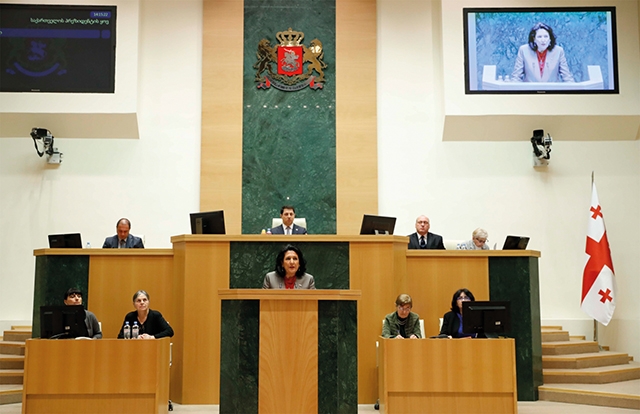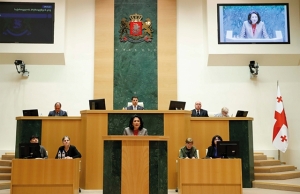President Salome Zurabishvili Gives Annual Parliament Speech
Georgian President Salome Zurabishvili gave her annual speech to Parliament on March 4, marking the beginning of the spring plenary sessions. In the address, her second since taking office, the President outlined the challenges faced by Georgia today, as well as the country’s future.
However, opposition parties and civic activists criticized the President for acting as a puppet of Bidzina Ivanishvili, billionaire Chairman of the ruling party Georgian Dream, and failing to critically analyze events.
“Almost 30 years have gone by since Georgia recovered its place in the international community as an independent nation,” Zurabishvili began. “30 years later, we sometimes fail to see where we have got to, to evaluate our real possibilities and the new opportunities in front of us.”
Georgia has become a global country within the international community, the President underlined. “We can no longer view world events as independent from us,” she said, giving the example of the recent coronavirus outbreak.
“Today’s global challenges are no longer contained in one’s territory and within one country’s borders,” she said, noting that the coronavirus has affected both Georgia’s health sector and economy.
Zurabishvili also underlined changing international relations in the region: “Yesterday’s enemies start peace talks while yesterday’s friends could start wars,” she warned, underlining the instability in the region which has a direct impact on Georgia, and could develop into larger conflicts at any time.
Calling on Georgia to unite behind a common goal, Zurabishvili noted that Georgia’s occupied territories also present a serious challenge, as human rights are frequently violated on the sides of both occupation lines. In doing so, she believes that Georgia will come closer to the EU and NATO. “It is our goal to become a more active player in NATO and the EU today,” she said. Cybersecurity, Black Sea security and communications are core issues.
In this regard, the President highlighted Euro-Atlantic integration and US relations as vital, especially in the military sphere, with NATO conducting yearly military exercises on Georgian territory.
Zurabishvili’s speech avoided critical analysis of the current political situation in Georgia and of the ruling party, Georgian Dream. Civic activists and the parliamentary opposition have criticized her address, with many members of the opposition refusing to attend.
United National Movement (UNM) MP Tina Bokuchava claimed that Zurabishvili is a puppet of Bidzina Ivanishvili, an idea supported by European Georgia MP Irma Nadirashvili who added, “we have no serious questions for her.”
UNM MP Roman Gotsiridze accused the President of avoiding serious issues: “She talked about everything, about football, Belarus, wine, but not about serious issues, including the political crisis in the country.”
Former Georgian Dream MP Tamar Khulordava claimed that the speech was “a general statement about everything and nothing.”
Civic activists protested outside the Parliament building on Wednesday evening, claiming that Zurabishvili reports to Ivanishvili rather than the Georgian people.
2019 was a busy year of protest in Georgia, with thousands of Georgians gathering in front of Parliament throughout the year. In May 2019, protestors violently clashed with police calling for proportional elections and for Giorgi Gakharia to step down as Interior Minister (he has since become Prime Minister of Georgia), among other things.
Despite Ivanishvili’s promise to incorporate proportional voting by 2020, the proposal failed to pass through Parliament. Zurabishvili addressed the upcoming parliamentary elections and electoral reform in her speech: although she insisted she will remain non-partisan and independent, she stressed the need for dialogue between parties.
“Differences of views between the opposition and the ruling party, including sometimes fierce opposition, is quite natural, especially in electoral times; but for us, a country located in a complex geopolitical environment, with 20% of our territory occupied, we need to be careful not to let such political struggles threaten the stability,” she underlined.
“Our generation has one duty and that is to overcome polarization,” she concluded. “This is our responsibility towards our future generations.”
By Amy Jones












